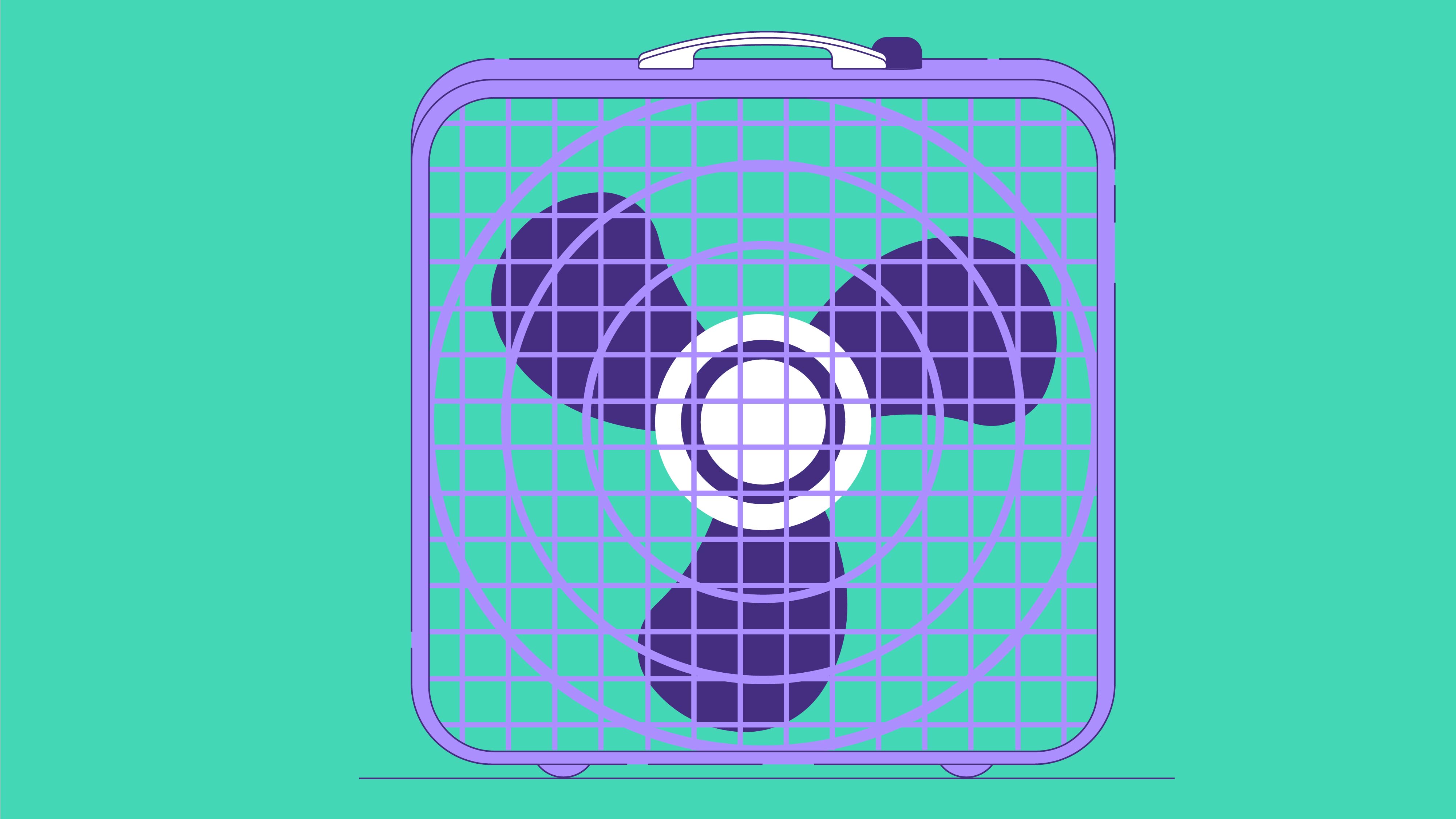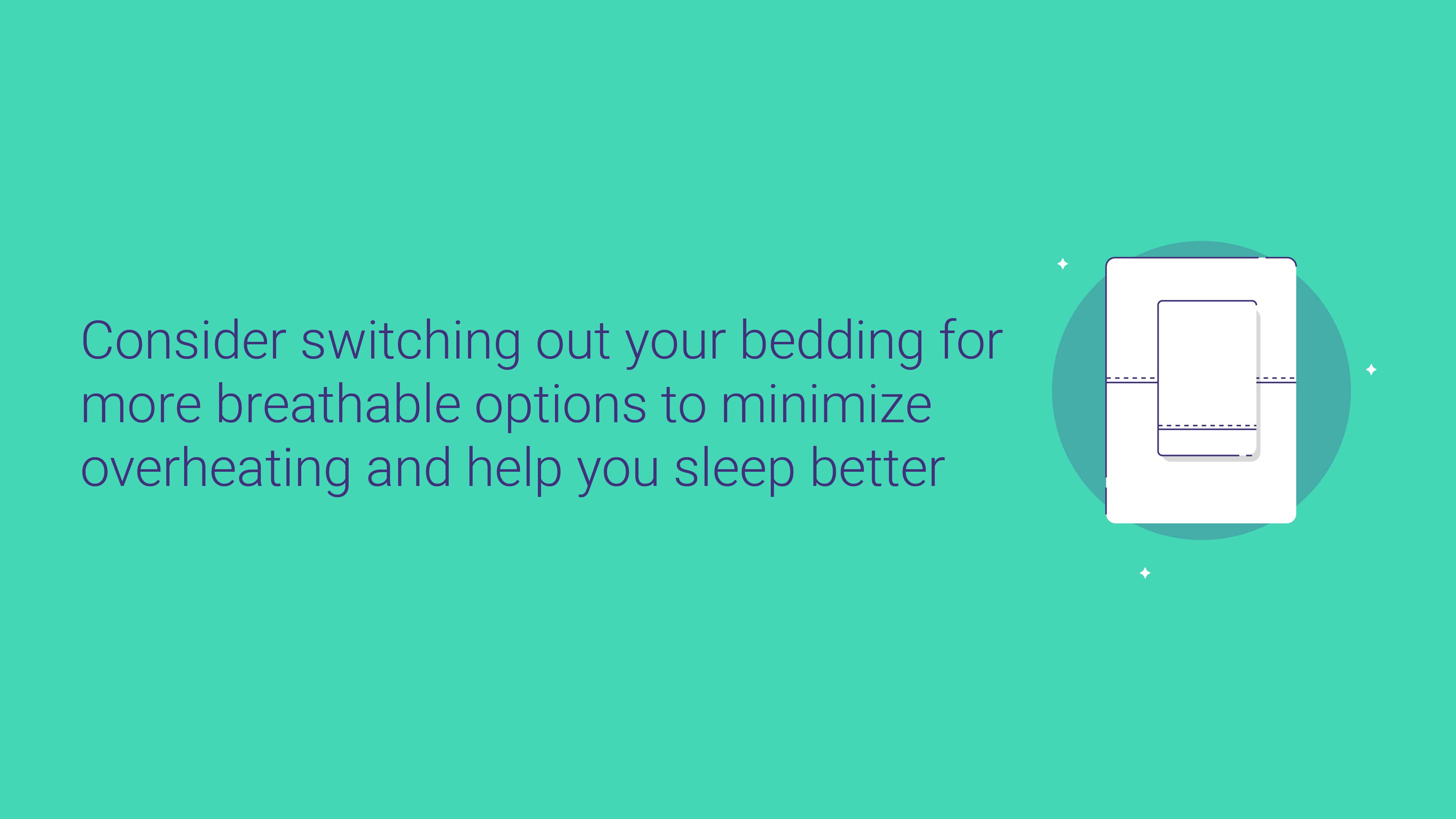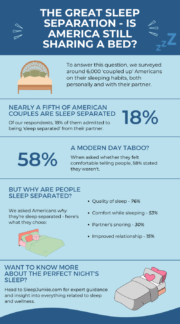
Is Sleeping With a Fan On Bad For Health?
- Sleeping with a fan can have several advantages, such as cooling your room and body, improving sleep quality, increasing air circulation, and being an affordable alternative to air conditioning that can help you sleep better on hot nights.
- Using a fan at night can also trigger allergies and worsen symptoms for people with asthma or hay fever due to circulating dust and allergens.
- Consider cooling bedding materials, wearing breathable pajamas, using light-colored curtains to block out sunlight, taking a warm bath or shower before bed, and even briefly chilling your bedsheets in the freezer.
While fans seem like a great way to cool your room down on hot summer nights without breaking the bank, sleeping with a fan on is somewhat controversial.
Although sleeping with a fan on won’t pose any serious or long-term health risks, the constant breeze can kick up dust and circulate dry air into your room, potentially impacting your health negatively. We dive into the arguments for and against using a fan throughout the night, along with some other easy ways to chill out on hot nights.
Advantages of a Sleeping With a Fan
On a hot night, or if you’re a sleeper who suffers from night sweats, it can be quite unbearable to sleep without the help of an air conditioner or fan. It manages the temperature in your room, in turn, cooling you down and helping you get to sleep. Let’s look at some of the reasons people argue sleeping with a fan is good for you.
Cooling
The main benefit of using a fan at night is it can cool you down and lower your core body temperature. It minimizes the tossing in turning due to heat and sweating, leaving your bed damp and uncomfortable.
For a cost-effective way to improve the cold air circulation and further cool down, place frozen water bottles in front of your fan at night. You can also fill a large bowl with ice cubes to achieve similar results. When the fan blows air past the bowl or bottles, it creates a cooler breeze.
Helps You Sleep
Being hot at night can make it difficult to fall or stay asleep, leading to daytime fatigue and a poor mood. Also, hot nights can make you sweat and excessive sweating can deplete your body of vital minerals.
For optimal sleep, your bedroom temperature should be between 60 to 67 degrees Fahrenheit. While a fan may not be able to get your room quite as cold, it will still help drop your bedroom’s temperature. Frankly, using a fan also beats sleeping in a 90-degree bedroom.
Increases Air Circulation
When there are no windows open or air flowing, your bedroom can get pretty stuffy. You can leave your window open during the day, but if it’s hot outside or you’re not home (an open window can pose a security risk), it’s not an option. Leaving your bedroom door open and using an air filter helps, but a fan typically does the best job in terms of increasing the airflow in your room.
Using the fan in your bedroom gives the room some needed freshness and beats stale, unpleasant odors. Not only that, but proper air circulation also makes it easier for you to breathe at night. A well-ventilated room can also help reduce the feelings of claustrophobia at night.
Inexpensive
Fans are great since they’re inexpensive and don’t use as much electricity as an air conditioner, keeping your bills down. If keeping an air conditioner on throughout the night is too expensive, a fan is your next best option to stay cool.
Drawbacks of a Sleeping With a Fan
Although sleeping with a fan has its benefits, the adverse may be bad enough to turn you away from using a fan. Sleeping with a fan triggers allergies, causes congestion, dries out your bedroom, and leads to muscle cramping.
Triggers Allergic Reactions
Your fan can potentially blow up flurries of dust and pollen particles from around your room. So, if you have asthma, allergies, or even hay fever, the dust flying around your room can worsen or trigger symptoms, causing runny nose, itchy eyes or throat, and sore throat. Even having one of the best hypoallergenic mattresses won’t protect you from kicked-up dust particles.
Before using your fan, take a look at its blades. When your fan is sitting around, it can collect allergens, like dust mites and dead skin cells, only increasing your risk of allergic reactions. Make sure to regularly clean your fan to reduce dust circulation in your bedroom.
Creates Dry Air
Fans create dry air, so the lack of humidity in the air can lead to dry skin, mouth, and eyes.
While using hydrating lotions and moisturizers can fix dry skin for some, it may not fully resolve the issue if you have excessively dry skin.
Also, if you sleep with your mouth open, the constant blast of air can cause an uncomfortable dry mouth. Keeping water nearby can help, but waking up in the middle of the night to drink water and soothe your dry throat is less than ideal.
Some people tend to sleep with their eyes partially open. While this normally has minimal negative side effects, the excessive dryness can cause eye irritation, especially for people who sleep with contact lenses on. Eye drops can hydrate your eyes, but again, nobody wants to wake up in the middle of the night just to apply eye drops.
Causes Congestion
Since fans dry out your nose, mouth, and throat, your body might overcompensate as a result, producing excess mucus to lubricate your body. However, the overproduction of mucus only blocks your nasal passage and leads to sinusitis, causing you to experience symptoms such as sinus headaches, a stuffy nose, and snoring.
You can potentially minimize congestion by drinking more water throughout the day. Also, running a humidifier alongside your fan helps to minimize the risk of congestion.
Aggravates Muscles
The concentrated, cold air of a fan directly on your body can cause you to wake up with stiff and sore muscles. If you sleep with a fan near your face, in particular, your neck can stiffen up and ache. This is because the cool air unintentionally causes muscle contractions, meaning your muscles tense up and cramp.
If you plan on using your fan at night, point it away from you or oscillate it rather than letting it blow directly onto you to prevent a stiff neck or muscles.
Other Ways to Beat the Heat
While you may want to avoid the potential downsides to sleeping with a fan, sleeping hot is still miserable. So, how else are you supposed to get some sleep? Take a look at some other easy methods to cool down before bed.
Use Cooling Bedding
Consider switching out your bedding for more breathable options to minimize overheating and help you sleep better.

If your mattress is older, it may not contain the various cooling technologies modern mattresses have. Look for cooling mattresses or cool mattress toppers made from materials such as gel, plant-based foam, charcoal, or latex and with breathable cover fabrics.
In addition, cooling pillows made from buckwheat, down, or airy foams are especially breathable. And for cool bedsheets, look for ones made from organic cotton, Tencel®, silk, or linen as they wick moisture away well in case you do get hot.
Instead of flannel or polyester blankets, look for comforters made from down, cotton, or linen so you don’t overheat during the night.
Wear the Appropriate Clothing
When trying to stay cool, be sure to wear loose clothing. Try wearing soft and breathable pajamas made from materials such as silk, cotton, or linen. Be sure to avoid materials including flannel, fleece, rayon, or polyester since they all tend to trap heat.
Try Light-Colored Curtains or Shades
Keeping sunlight out of your bedroom during the day keeps the heat out, in turn reducing the overall temperature in your bedroom. While blackout curtains keep light out well, their dark color can actually make your room hotter. Light-colored or reflective shades are best for keeping your room cool.
Take a Warm Bath or Shower
Taking a warm bath or shower seems counterintuitive, but it helps cool you down before sleeping. When you exit the shower or bath and the water evaporates, your body naturally cools down. Cooling down triggers your circadian rhythm and it tells your body that it’s time to sleep.
Pop Your Sheets in the Freezer
While it sounds a bit bizarre, try putting your bedsheets in the freezer for roughly 10 to 20 minutes to get them nice and cold. A quick session in the freezer won’t freeze your sheets solid but will get them just cool enough to help you sleep.
Place a Damp Cloth on Your Head
A gently dampened and cold cloth can help you stay cool during the night. However, unless you’re a back sleeper, you may risk the cloth falling off your head and needing to readjust it during the night.
FAQs
Can sleeping with a fan on make you sick?
Fans don’t contain active bacteria capable of making you sick. However, cold air blowing on your body throughout the night can worsen the symptoms of a cold or flu. It can also aggravate allergies, which can have symptoms similar to a cold.
Can a fan catch fire overnight?
All electrical appliances have a small risk of overheating and catching fire, though this can be especially dangerous when you’re asleep and at risk of smoke inhalation.
Older, outdated floor fans are more hazardous than new and modern electric fans. Regardless of your fan’s age, you should still clean your fan blades of lint and dust as they are a fire hazard. If the fan’s motors overheat, it can potentially ignite any dust on your fan.
Rather than leaving your floor fan on overnight, instead, use it on a timer for just long enough to cool you down and help you sleep.
Is sleeping with a fan bad for your ears?
The constant hum of a fan, especially if it’s extremely old or poor-quality, may irritate your ears and potentially cause an earache. If your fan is too loud, it can cause major irritation and make it difficult to sleep. While you can use earplugs, using a newer fan is a better option because they’re typically quiet or practically noiseless.
Is it okay to sleep without blankets?
It’s completely okay to sleep without blankets, and it can even be helpful on hot and sweaty nights. Some people may be unable to sleep with a blanket because they get overly hot and feel restricted beneath it. However, others may not be able to fall asleep without a blanket because the weight of the blanket helps them sleep and better maintains their body temperature.
Is sleeping with a space heater safe?
Space heaters are designed to keep a small area warm and are much more affordable than keeping the furnace on during the night. However, leaving your space heater on increases the carbon monoxide levels in a room, raising a person’s risk of asphyxia.
Space heaters are responsible for 79 percent of fatal home heating fires. You need proper ventilation in your room when sleeping with a space heater on to prevent it from overheating, as well, and igniting nearby furniture or clothing.
If you want to heat your room at night, it’s best to leave it on while you’re awake and then shut it off when you sleep.
Conclusion
Although fans can be great if you don’t have access to an air conditioner, the health risks they pose may not be worth it. It’s best to use your fan during the day and opt for different solutions to lower your room’s temperature at night so you don’t face issues like dry eyes, congestion, or allergic reactions.



Comments (1) Leave a reply
I have read through all the suggestions you have discussed on here . They are very good advice..